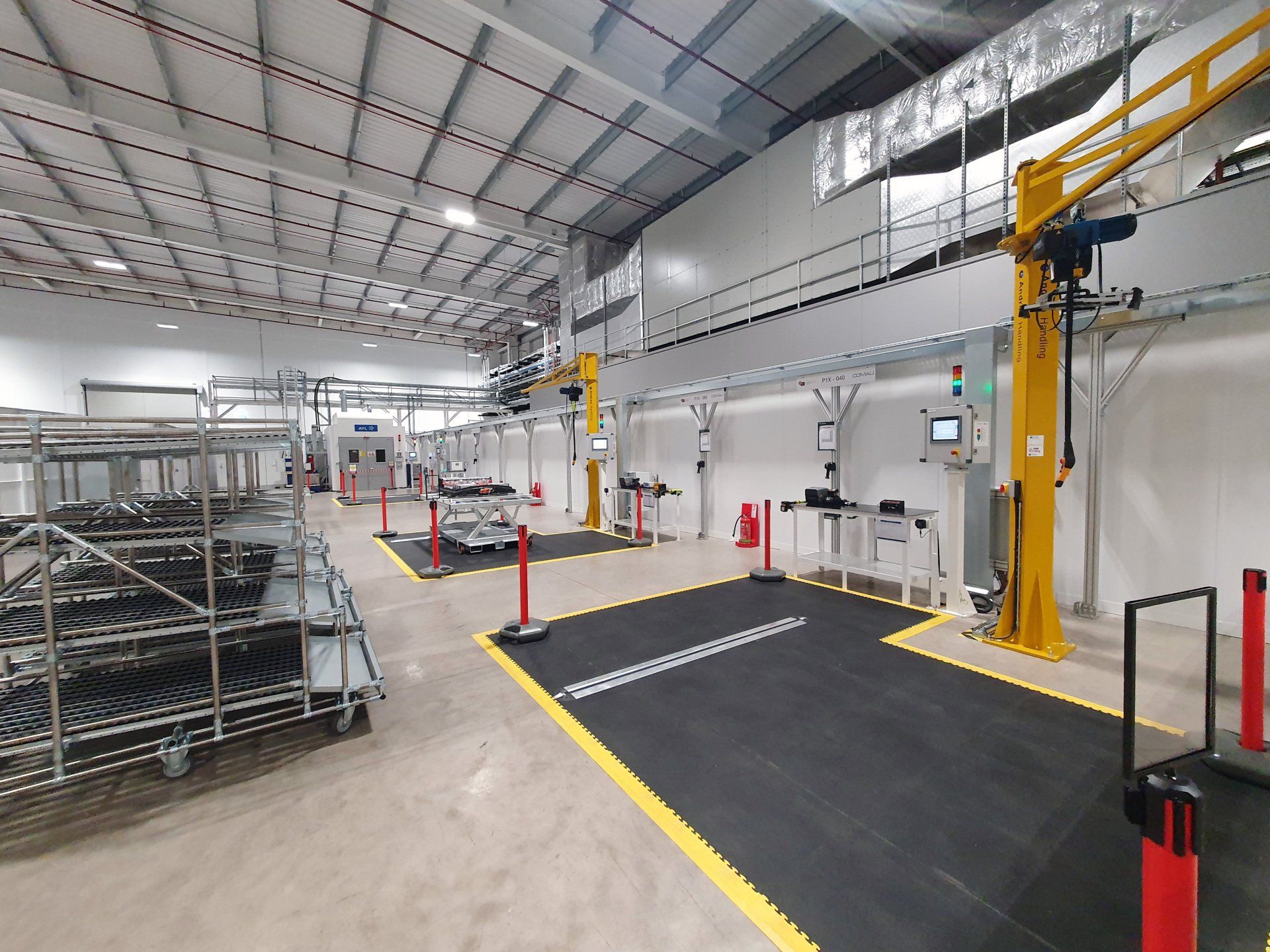'Module and Pack' assembly line now operational at UKBIC
The £130 million UK Battery Industrialisation Centre (UKBIC) has moved a step closer to opening with the confirmation that the facility’s Module and Pack suite of specialist battery manufacturing equipment is now operational.
The Module and Pack assembly line is the first of UKBIC’s innovative battery manufacturing equipment – sourced and supplied from leading manufacturers across the globe – to have been installed and commissioned at the publicly funded ‘open access’ 18,500 square metre battery development facility in Coventry.
UKBIC’s highly flexible Module and Pack assembly line enables customers to test and produce low volumes of Cylindrical and Pouch cell battery technology. In addition, it has the capacity to produce 50 modules and 2.5 packs over every 8-hour shift.
The line has manual and automatic workstations; and has cylindrical cell ‘pick and place’ capability, for cell voltage testing and impedance, as well as the ability to place cells into a module in either combination of cell orientation.

The facility features a state-of-the-art laser precision specialist welder for welding cells to busbars at industry relevant speeds and accuracy. In addition, the line has pioneering battery leak functionality, which allows leaks to be more easily discovered prior to full scale up, whilst the layout has space reserved to accommodate future customer requirements such as alternative joining technologies and plasma cleaning
Although UKBIC’s cell making equipment is identical to that of emerging Gigafactories now under construction, UKBIC’s Module and Pack equipment mimics leading cutting-edge processes you would expect to find in high throughput battery assembly plants.
As well as Module and Pack capability, the battery manufacturing equipment being installed at the facility covers the whole production process from electrode manufacturing, cylindrical and pouch cell assembly, to formation aging and testing, as well as a prototyping competence centre for specialist ultra-low volume builds. The facility is a pioneering facility, which provides the missing link between battery technology, which has proved promising at laboratory or prototype scale, and successful mass production.
Ian Whiting, UKBIC’s Commercial Director, said: “We’re delighted to have our Module and Pack line up and running. This is the first part of the facility which customers can now use.
“Our unique, open-access facility allows organisations in the UK to prove whether their promising technologies can be manufactured at the required volume, speed, performance and cost to be commercially successful. Clients can bring their own employees in to work and be trained with us on the line. Customers can also integrate processes unique to their own products temporarily to our facility. And we can help them build ‘runner lines’ at UKBIC to enable them to prove higher throughput production in early stages whilst customers build their own production lines.”
UKBIC is a key part of the Faraday Battery Challenge, a Government programme to fast track the development of cost-effective, high-performance, durable, safe, low-weight and recyclable batteries.
Faraday Battery Challenge
Tony Harper, Industrial Strategy Challenge Director – Faraday at UK Research and Innovation, said:
“The UK Battery Industrialisation Centre has a vital role to play in the development of the battery industry here in the UK. With the Module and Pack suite now operational this is a major step forward for the UK battery industry that will benefit companies of all sizes. I look forward to seeing the Centre grow and develop over the coming months as this world-class facility brings the full suite of battery manufacturing capabilities on stream.”
WMG
Professor David Greenwood, WMG Director of Industrial Engagement and CEO WMG centre HVM Catapult comments: “We’re delighted to see this critical step along the path to UK battery manufacture is complete. The UK Battery Industrialisation Centre is key to the UK’s battery scale up operations and as a founding partner, WMG are delighted to continue supporting their growth. Electrification is no longer just an issue for cars – WMG are supporting programmes in aerospace, rail, marine and freight as well as smaller vehicles like motorcycles and e-scooters. This new unique facility will allow companies to produce prototypes and limited volume production runs for these and other markets.”
Coventry City Council
Councillor Jim O’Boyle cabinet member for jobs and regeneration at Coventry City Council, said, “This news brings us another step closer to making Coventry the capital of battery manufacturing in the UK. Coventry was the heart of the industrial revolution and now it can be the heat of the green industrial revolution.
“Proving that we have the skills, technology and people to support this state-of-the-art product that will power the next generation of vehicles which can and must be made on mass here is our city to support the automotive sector.
“UKBIC is set to thrive here, and the next obvious step is to build a Gigafactory here so we mass produce batteries too.”
CWLEP
Nick Abell, chair of the Coventry and Warwickshire Local Enterprise Partnership (CWLEP) and a director of UKBIC, said: “UKBIC is a development which we are proud of here in Coventry and Warwickshire since it is leading the UK’s ground-breaking expertise in the battery industry.
“The opening of the Module and Pack line up is another stage in developing battery technology as we move towards a more environmentally-friendly future as well as boosting the economy.”
Definitions:
- Module and Pack: Simply put, battery packs are usually made of several modules and those modules are made up of numerous battery cells. The joining and mechanical assembly techniques used are critical to ensuring performance, repeatability and durability. Complexity is added when specialist cooling systems are integrated.
- Cylindrical cell technology: The cylindrical cell continues to be one of the most widely used packaging types for primary and secondary rechargeable batteries. The advantages are ease of manufacture and good mechanical stability. The tubular cylinder can withstand high internal pressures without deforming.
- Pouch cell technology: The pouch cell offers a simple, flexible and lightweight solution to battery design. The pouch cell makes the most efficient use of space and achieves a 90 to 95 percent packaging efficiency, the highest among battery packs.
Maximum dimensions and testing features of the line are set at –
Module Assembly:
- Pouch (Max mm) 400x400x250
- Cylindrical (Max mm) 800x250x100
- Max weight 30kg
- Max Voltage 60V
- Max Capacity
- Pouch 200Ah
Pouch Assembly:
- Max (mm) 2500x1750x500
- Max weight 1000KgMax Voltage 0-1200 Vdc
- Max Capacity 500KWh
The £130 million UK Battery Industrialisation Centre (UKBIC) is a pioneering concept in the race to develop battery technology for the transition to a greener future. The unique facility provides the missing link between battery technology, which has proved promising at laboratory or prototype scale, and successful mass production. Based in Coventry, the publicly-funded battery product development facility welcomes manufacturers, entrepreneurs, researchers and educators, and can be accessed by any organisation with existing or new battery technology – if that technology will bring green jobs and prosperity to the UK.
In addition to funding from the Faraday Battery Challenge through UK Research and Innovation and the Industrial Strategy Challenge Fund, UKBIC is also part-funded through the West Midlands Combined Authority. The project has been delivered through a consortium of Coventry City Council, Coventry and Warwickshire Local Enterprise Partnership and WMG, at the University of Warwick. UKBIC was created in 2018 following a competition led by the Advanced Propulsion Centre with support from Innovate UK.


